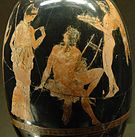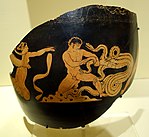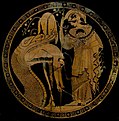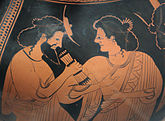Грчка митологија
Грчка митологија је корпус митова који воде порекло из античке Грчке. Ове приче се баве пореклом и природом света, животом и активностима божанстава, хероја, и митолошких бића, као и пореклом и значењем култа и ритуала старих Грка. Савремени научници проучавају митове у покушају да расветле религијске и политичке установе античке Грчке и њене цивилизације и да стекну разумевање природе мита.[1]

Грчки митови су првобитно ширени усмено-поетичком традицијом, највјеројатније од стране минојских и микенских певача, почевши од 18. века пре нове ере;[2] и на крају у виду митова о херојима тројанског рата и његовим последицама, који су постали део усмене традиције преко Хомерових епова, Илијадае и Одисеје. Две песме Хомеровог савременика, Хесиода, Теогонија и Послови и дани, садрже приче о настанку света, наслеђу божанских владара, стварању човека, пореклу људских невоља и жртвених пракси. Митови су такође сачувани у Хомерским химнама, у одељцима епова о епском циклусу, у лирским песмама, трагедијама и комедијама из петог века пре нове ере, у научним и песничким списима хеленистичког доба и текстовима из времена римског царства, писаним од стране Плутарха и Паусаније.
Поред приповедачких налазишта античке Грчке књижевности, сликовити прикази богова, хероја и митолошких догађаја били су истакнути на древним вазама-сликама, украсима заветованих жртава и многим другим артефактима. Геометријски нацрти на керамици из осмог века пре нове ере приказују сцене из тројанског циклуса као и Хераклове подвиге. У наставку архајског, класичног и хеленистичког периода, појављују се Хомерске и разне друге митолошке сцене, које допуњују постојеће књижевне изворе.[3]
Грчка митологија је имала велики утицај на културу, уметност и књижевност западњачких цивилизација и остаје део њиховог културног наслеђа и језика. Песници и сликари су од античког доба до данас вукли инспирацију из грчке митологије и открили су савремени значај и релевантност у уметничким темама.[4]
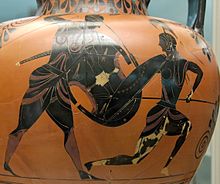
Настанак света
уредиПо грчком миту, у почетку су небо и земља били измешани и владао је Хаос. Затим су се из Хаоса издвојили богиња Геја - земља и Уран - небо. Њих двоје изродили су остале богове - титане. Међутим, Уран бојећи се да му неко од деце не преузме власт затвори титане под земљу. Међутим, један бог - Хронос успео је да изађе из провалије и да ослободи осталу браћу и сестре. Тада, као што се Уран и бојао, Хронос одузме власт оцу и постаде господар света. Међутим, Хроноса је затекла иста судбина као и његовог оца, јер га је свргнуо са власти његов млађи син - Зевс.
Настанак људи
уредиУ почетку, Грци су мислили да су људи никли из земље попут биљака, међутим временом је то веровање одбачено и мислило се да је титан Прометеј од глине направио човека, а да му је Атена удахнула душу. Прометеј је људе штитио, помагао им и учио их. Од Аполона је украо ватру и дао је људима, ухватио је дивљег бика и дао људима да га упрегну, научио их је како да ваде руде. Због свега овога Зевс се наљутио и наређено је да Прометеј буде окован гвозденим ланцима и на Кавказу он беше прикован за једну стену где је сваки дан слетао орао који му је кљуцао јетру. Прометеј је дуго овако висио док га Херакле није ослободио.
Хероји
уредиУ грчкој митологији спомињу се и полубогови, који се називају херојима. Они имају натчовечанску снагу, памет, спретност. Обично су били синови богова и смртника, заштитници људи, убице чудовишта и разбојника. Најпознатији грчки хероји јесу Херакле (Хераклес, Херкулес, Херкул), Тезеј, Јасон, Персеј, Диоскури.
Грчки митови
уредиНеки од најпознатијих грчких митова су:
Референце
уреди- ^ „Volume: Hellas, Article: Greek Mythology”. Encyclopaedia The Helios. 1952.
- ^ Cartwirght, Mark. „Greek Mythology”. Ancient History Encyclopedia. Приступљено 26. 3. 2018.
- ^ „Greek Mythology”. Encyclopædia Britannica. 2002.
- ^ J.M. Foley, Homer's Traditional Art, 43
Литература
уреди- Grevs, Robert (2002). Grčki mitovi. Beograd: Familet. ISBN 978-86-7646-007-6.
- Aeschylus, The Persians. See original text in Perseus program.
- Aeschylus, Prometheus Bound. See original text in Perseus program.
- Apollodorus, Library and Epitome. See original text in Perseus program.
- Apollonius of Rhodes, Argonautica, Book I. See original text in Sacred Texts.
- Cicero, De Divinatione. See original text in the Latin Library.
- Cicero, Tusculanae resons. See original text in the Latin Library.
- Herodotus, The Histories, I. See original text in the Sacred Texts.
- Hesiod, Works and Days. Translated into English by Hugh G. Evelyn-White.
- Hesiod (1914). Theogony. Превод: Hugh Gerard Evelyn-White — преко Викизворника.
- Homer, Iliad. See original text in Perseus program.
- Homeric Hymn to Aphrodite. Translated into English by Gregory Nagy.
- Homeric Hymn to Demeter. See original text in Perseus project.
- Homeric Hymn to Hermes. See the English translation in the Medieval and Classical Literature Library Архивирано на сајту Wayback Machine (25. октобар 2008).
- Ovid, Metamorphoses. See original text in the Latin Library.
- Pausanias.
- Pindar, Pythian Odes, Pythian 4: For Arcesilas of Cyrene Chariot Race 462 BC. See original text in the Perseus program.
- Plato, Apology. See original text in Perseus program.
- Plato, Theaetetus. See original text in Perseus program.
- Ackerman, Robert (1991). „Introduction”. Prolegomena to the Study of Greek Religion by Jane Ellen Harrison (Reprint изд.). Princeton University Press. ISBN 978-0-691-01514-9.
- G, Albala Ken; Durst, Johnson Claudia; Johnson Vernon E. (2000). „Origin of Mythology”. Understanding the Odyssey. Courier Dover Publications. ISBN 978-0-486-41107-1.
- Algra, Keimpe (1999). „The Beginnings of Cosmology”. The Cambridge Companion to Early Greek Philosophy. Cambridge University Press. ISBN 978-0-521-44667-9.
- Allen, Douglas (1978). „Early Methological Approaches”. Structure & Creativity in Religion: Hermeneutics in Mircea Eliade's Phenomenology and New Directions. Walter de Gruyter. ISBN 978-90-279-7594-2.
- „Argonaut”. Encyclopædia Britannica. 2002.
- Betegh, Gábor (2004). „The Interpretation of the poet”. The Derveni Papyrus. Cambridge University Press. ISBN 978-0-521-80108-9.
- Bonnefoy, Yves (1992). „Kinship Structures in Greek Heroic Dynasty”. Greek and Egyptian Mythologies. University of Chicago Press. ISBN 978-0-226-06454-3.
- Bulfinch, Thomas (2003). „Greek Mythology and Homer”. Bulfinch's Greek and Roman Mythology. Greenwood Press. ISBN 978-0-313-30881-9.
- Burkert, Walter (2002). „Prehistory and the Minoan Mycenaen Era”. Greek Religion: Archaic and Classical (translated by John Raffan). Blackwell Publishing. ISBN 978-0-631-15624-6.
- Burn, Lucilla (1990). Greek Myths. University of Texas Press. ISBN 978-0-292-72748-9.
- Bushnell, Rebecca W. (2005). „Helicocentric Stoicism in the Saturnalia: The Egyptian Apollo”. Medieval A Companion to Tragedy. Blackwell Publishing. ISBN 978-1-4051-0735-8.
- Chance, Jane (1994). „Helicocentric Stoicism in the Saturnalia: The Egyptian Apollo”. Medieval Mythography. University Press of Florida. ISBN 978-0-8130-1256-8.
- Caldwell, Richard (1990). „The Psychoanalytic Interpretation of Greek Myth”. Approaches to Greek Myth. Johns Hopkins University Press. ISBN 978-0-8018-3864-4.
- Calimach, Andrew (2002). „The Cultural Background”. Lovers' Legends: The Gay Greek Myths. Haiduk Press. ISBN 978-0-9714686-0-3.
- Cartledge, Paul A. (2002). „Inventing the Past: History v. Myth”. The Greeks. Oxford University Press. ISBN 978-0-19-280388-7.
- Cartledge, Paul A. (2004). The Spartans (translated in Greek). Livanis. ISBN 978-960-14-0843-9.
- Cashford, Jules (2003). „Introduction”. The Homeric Hymns. Penguin Classics. ISBN 978-0-14-043782-9.
- Dowden, Ken (1992). „Myth and Mythology”. The Uses of Greek Mythology. Routledge (UK). ISBN 978-0-415-06135-3.
- Dunlop, John (1842). „Romances of Chivalry”. The History of Fiction. Carey and Hart. ISBN 978-1-149-40338-9.
- Edmunds, Lowell (1980). „Comparative Approaches”. Approaches to Greek Myth. Johns Hopkins University Press. ISBN 978-0-8018-3864-4.
- „Euhemerus”. Encyclopædia Britannica. 2002.
- Foley, John Miles (1999). „Homeric and South Slavic Epic”. Homer's Traditional Art. Penn State Press. ISBN 978-0-271-01870-6.
- Gale, Monica R. (1994). „The Cultural Background”. Myth and Poetry in Lucretius. Cambridge University Press. ISBN 978-0-521-45135-2.
- „Greek Mythology”. Encyclopædia Britannica. 2002.
- „Greek Religion”. Encyclopædia Britannica. 2002.
- Griffin, Jasper (1986). „Greek Myth and Hesiod”. The Oxford Illustrated History of Greece and the Hellenistic World edited by John Boardman, Jasper Griffin and Oswyn Murray. Oxford University Press. ISBN 978-0-19-285438-4.
- Grimal, Pierre (1986). „Argonauts”. The Dictionary of Classical Mythology. Blackwell Publishing. ISBN 978-0-631-20102-1.
- Hacklin, Joseph (1994). „The Mythology of Persia”. Asiatic Mythology. Asian Educational Services. ISBN 978-81-206-0920-4.
- Hanson, Victor Davis; Heath, John (1999). Who Killed Homer (translated in Greek by Rena Karakatsani). Kakos. ISBN 978-960-352-545-5.
- Hard, Robin (2003). „Sources of Greek Myth”. The Routledge Handbook of Greek Mythology: based on H. J. Rose's "A Handbook of Greek mythology". Routledge (UK). ISBN 978-0-415-18636-0.
- „Heracles”. Encyclopædia Britannica. 2002.
- Jung Carl Gustav, Kerényi Karl (2001). „Prolegomena”. Essays on a Science of Mythology (Reprint изд.). Princeton University Press. ISBN 978-0-691-01756-3.
- Jung, C.J. (2002). „Troy in Latin and French Joseph of Exeter's "Ylias" and Benoît de Sainte-Maure's "Roman de Troie"”. Science of Mythology. Routledge (UK). ISBN 978-0-415-26742-7.
- Kelly, Douglas (2003). „Sources of Greek Myth”. An Outline of Greek and Roman Mythology. Douglas Kelly. ISBN 978-0-415-18636-0.
- Kelsey, Francis W. (1889). A Handbook of Greek Mythology. Allyn and Bacon.
- Kirk, Geoffrey Stephen (1973). „The Thematic Simplicity of the Myths”. Myth: Its Meaning and Functions in Ancient and Other Cultures. University of California Press. ISBN 978-0-520-02389-5.
- Kirk, Geoffrey Stephen (1974). The Nature of Greek Myths. Harmondsworth: Penguin. ISBN 978-0-14-021783-4.
- Klatt J. Mary, Brazouski Antoinette (1994). „Preface”. Children's Books on Ancient Greek and Roman Mythology: An Annotated Bibliography. Greenwood Press. ISBN 978-0-313-28973-6.
- Lexicon Iconographicum Mythologiae Classicae. Artemis-Verlag. 1981—1999. Недостаје или је празан параметар
|title=(помоћ) - Miles, Geoffrey (1999). „The Myth-kitty”. Classical Mythology in English Literature: A Critical Anthology. University of Illinois Press. ISBN 978-0-415-14754-5.
- Morris, Ian (2000). Archaeology As Cultural History. Blackwell Publishing. ISBN 978-0-631-19602-0.
- „myth”. Encyclopædia Britannica. 2002.
- Nagy, Gregory (1992). „The Hellenization of the Indo-European Poetics”. Greek Mythology and Poetics. Cornell University Press. ISBN 978-0-8014-8048-5.
- Nilsson, Martin P. (1940). „The Religion of Eleusis”. Greek Popular Religion. Columbia University Press.
- North John A.; Mary, Beard; Price Simon R.F. (1998). „The Religions of Imperial Rome”. Classical Mythology in English Literature: A Critical Anthology. Cambridge University Press. ISBN 978-0-521-31682-8.
- Papadopoulou, Thalia (2005). „Introduction”. Heracles and Euripidean Tragedy. Cambridge University Press. ISBN 978-0-521-85126-8.
- Percy, William Armostrong III (1999). „The Institutionalization of Pederasty”. Pederasty and Pedagogy in Archaic Greece. Routledge (UK). ISBN 978-0-252-06740-2.
- Poleman, Horace I. (март 1943). „Review of "Ouranos-Varuna. Etude de mythologie comparee indo-europeenne by Georges Dumezil"”. Journal of the American Oriental Society. 63 (1): 78—79. ISSN 0003-0279. JSTOR 594160. doi:10.2307/594160.
- Reinhold, Meyer (20. 10. 1970). „The Generation Gap in Antiquity”. Proceedings of the American Philosophical Society. 114 (5): 347—65. JSTOR 985800.
- Rose, Herbert Jennings (1991). A Handbook of Greek Mythology. Routledge (UK). ISBN 978-0-415-04601-5.
- Segal, Robert A. (1991). „A Greek Eternal Child”. Myth and the Polis edited by Dora Carlisky Pozzi, John Moore Wickersham. Cornell University Press. ISBN 978-0-8014-2473-1.
- Segal, Robert A. (4. 4. 1990). „The Romantic Appeal of Joseph Campbell”. Christian Century. Архивирано из оригинала 7. 1. 2007. г.
- Segal, Robert A. (1999). „Jung on Mythology”. Theorizing about Myth. Univ of Massachusetts Press. ISBN 978-1-55849-191-5.
- Stoll, Heinrich Wilhelm (translated by R. B. Paul) (1852). Handbook of the religion and mythology of the Greeks. Francis and John Rivington.
- Trobe, Kala (2001). „Dionysus”. Invoke the Gods. Llewellyn Worldwide. ISBN 978-0-7387-0096-0.
- „Trojan War”. Encyclopaedia The Helios. 1952.
- „Troy”. Encyclopædia Britannica. 2002.
- „Volume: Hellas, Article: Greek Mythology”. Encyclopaedia The Helios. 1952.
- Walsh, Patrick Gerald (1998). „Liberating Appearance in Mythic Content”. The Nature of the Gods. Oxford University Press. ISBN 978-0-19-282511-7.
- Weaver, John B. (1998). „Introduction”. The Plots of Epiphany. Walter de Gruyter. ISBN 978-3-11-018266-8.
- Winterbourne, Anthony (2004). „Spinning and Weaving Fate”. When the Norns Have Spoken. Fairleigh Dickinson University Press. ISBN 978-0-8386-4048-7.
- Wood, Michael (1998). „The Coming of the Greeks”. In Search of the Trojan War. University of California Press. ISBN 978-0-520-21599-3.
- Gantz, Timothy (1993). Early Greek Myth: A Guide to Literary and Artistic Sources. Johns Hopkins University Press. ISBN 978-0-8018-4410-2.
- Graves, Robert (1993) [1955]. The Greek Myths (Cmb/Rep изд.). Penguin (Non-Classics). ISBN 978-0-14-017199-0.
- Hamilton, Edith (1998) [1942]. Mythology (New изд.). Back Bay Books. ISBN 978-0-316-34151-6.
- Kerenyi, Karl (1980) [1951]. The Gods of the Greeks (Reissue изд.). Thames & Hudson. ISBN 978-0-500-27048-6.
- Kerenyi, Karl (1978) [1959]. The Heroes of the Greeks (Reissue изд.). Thames & Hudson. ISBN 978-0-500-27049-3.
- Luchte, James (2011). Early Greek Thought: Before the Dawn. Bloomsbury. ISBN 978-0-567-35331-3.
- Morford M.P.O., Lenardon L.J. (2006). Classical Mythology. Oxford University Press. ISBN 978-0-19-530805-1.
- Pinsent, John (1972). Greek Mythology. Bantam. ISBN 978-0-448-00848-6.
- Pinsent, John (1991). Myths and Legends of Ancient Greece. Library of the World's Myths and Legends. Peter Bedrick Books. ISBN 978-0-87226-250-8.
- Powell, Barry (2008). Classical Myth (6th изд.). Prentice-Hall. ISBN 978-0-13-606171-7.
- Powell, Barry (2001). A Short Introduction to Classical Myth. Prentice-Hall. ISBN 978-0-13-025839-7.
- Ruck Carl, Staples Blaise Daniel (1994). The World of Classical Myth. Carolina Academic Press. ISBN 978-0-89089-575-7.
- Smith, William (1870), Dictionary of Greek and Roman Biography and Mythology.
- Veyne, Paul (1988). Did the Greeks Believe in Their Myths? An Essay on Constitutive Imagination. (translated by Paula Wissing). University of Chicago. ISBN 978-0-226-85434-2.
- Woodward, Roger D. (editor) (2007). The Cambridge Companion to Greek Mythology. Cambridge; New York: Cambridge University Press. ISBN 978-0-521-84520-5.
- Nilsson, Martin P. (април 2009). The Mycenaean Origin of Greek Mythology. BiblioBazaar. ISBN 9780559057984.
Спољашње везе
уреди- Library of Classical Mythology Texts translations of works of classical literature
- LIMC-France Архивирано на сајту Wayback Machine (25. јун 2016) provides databases dedicated to Graeco-Roman mythology and its iconography.


